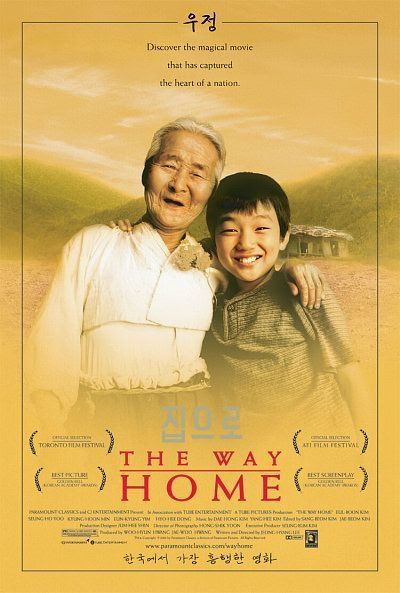
With the unexpected box-office success of her second feature, Lee Jeong-hyang has now earned the title of Korea's most commercially successful woman director. Although the widespread popularity of her debut film Art Museum by the Zoo can in part be attributed to star actress Shim Eun-ha, her latest work The Way Home offers nothing more in star power than a 7-year old boy and a 77-year old grandmother. Based purely on its strengths in storytelling this film has become a popular and beloved feature in its home country.
The Way Home opens with a single mother who, faced with financial troubles, decides to leave her seven-year son with his mute grandmother in the countryside. Having run away from home at a young age, the mother introduces the two to each other for the first time and then leaves for the city. The boy is furious at this upheaval in his life, taking out his frustrations by misbehaving and making wild demands of his grandmother.
The film was shot in a remote village of only eight households, with amateur actors taking all the roles save that of the young boy. Kim Ul-boon, the woman who plays the grandmother, was scouted from another village when the director spotted her walking down the road. Having never seen a movie before in her life, she nonetheless proved to be a talented and devoted actress, and she has since become a minor celebrity.
Apart from being a mainly personal story, The Way Home also highlights the world of difference that exists between rural and urban Korea. Without being preachy, the film manages to highlight some of the aspects of rural life that have been lost in the course of development. The film's main strength remains its storytelling, however. Although the plot contains few surprises, it develops in such natural fashion that it doesn't feel like a story is being told at all.
I admit I was shocked to see how well this film performed at the box-office when it was released in April. When you watch it, it seems to contain not a trace of commercialism, yet it managed to outperform both Hollywood blockbusters and star-studded local movies to land at #1 in the box-office. A small chunk of hope for those who support modestly-packaged films.
credits to korean movie review
2 comments:
its a nice show but it got boring.
I watched it on Channel U the other day too. Quite sweet, but not as exceptionally touching as critics made it out to be; and yes Faith is right in a sense, it can get quite boring at certain parts.
Post a Comment